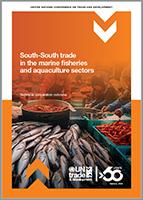
Marine fisheries and aquaculture represent a key source of income, food security, nutrition, and employment in many developing countries, particularly for Least Developing countries (LDCs) and Small Island Developing States (SIDS).
All South-South trade in the fisheries and aquaculture sectors has experienced large growth over the past decade, reaching double or even triple digits. In 2022, South-South trade across various fisheries sectors — marine fisheries, aquaculture, fish processing, and fishing vessels — amounted to $39 billion.
Developing countries’ exports of fisheries and aquaculture processed products now account for 53 per cent of the global share. These countries have also made significant strides in value addition within their industries.
Developing countries also exhibit notable trade competitiveness in various marine species and by-products, as indicated by a positive value in the Revealed Comparative Analysis (RCA) analysis. However, these activities are currently threatened by over fishing, harmful subsidies, climate change and pollution.
Within the current international trade context, developing countries have limited incentives to move up global value chains (GVCs) for ocean-based products due to current tariffs and moderate tariff escalation3, and a high prevalence and incidence of non-tariff measures.
The GSTP provides an agile and flexible platform of South-South trade cooperation that allows its participants to address tariffs, para-tariffs, and non-tariff measures, and engage in direct trade measures and sectoral agreements.
The Agreement can be leveraged to reduce or phase out tariffs (including any remaining tariff peaks) and non-tariff measures, harmonizing export and import requirements, establishing supply contracts, sharing technology and knowledge among participants, and establishing sectoral agreements.
A sectoral arrangement focused on fisheries and other marine resources could serve to increase value addition, strengthen trade facilitation, and foster sustainable ecosystem-based stock management, in a manner consistent with the United Nations Convention of the Law of the Sea, and multilateral and regional fisheries agreements.
The UNCTAD-FAO partnership on ocean economy can be further leveraged in this regard. These actions could also serve to improve food security by increasing availability and affordability of protein- and micro-nutrients rich food, foster resilience through geographical trade diversification, expand sustainable fisheries, aquaculture and other sustainable ocean-based trade with high complementarity and value addition potential among participants.
This technical note is the first issue of a series tailored to participants of the Global System of Trade Preferences among developing countries (GSTP), for which UNCTAD is the Secretariat.
This first note in the series addresses marine fisheries and aquaculture and examines possible avenues for growth, diversification, cooperation, value addition, and enabling actions on sustainable ocean economy, consistent with the UNCTAD’s Bridgetown Covenant (2021).


